What is Dong Quai?
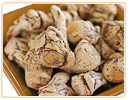 Dong quai is an herb natively grown in the cold mountains of China, Japan, and Korea. Dong quai is one of the most popular plants in Chinese medicine and is used as a nourishing blood tonic. It is also used to balance female hormones during the menstrual cycle. Dong quai is an herb natively grown in the cold mountains of China, Japan, and Korea. Dong quai is one of the most popular plants in Chinese medicine and is used as a nourishing blood tonic. It is also used to balance female hormones during the menstrual cycle.
Known as the "female ginseng", Dong quai is mainly used to treat gynecological disorders, but it can be used to treat disorders affecting both genders. Dong quai's health benefits can be traced back to its historical roots, which are detailed below.
Origins of Dong Quai
Dong quai herbs have been used for thousands of years in traditional Asian medicine. An extract of Dong quai can be found in a treatment called Eumenol and this was popular throughout Europe in the late 1800s as a remedy for gynecological problems. Today there has been a revived interest in Dong quai as a treatment for gynecological disorders because of its supposed estrogen-like properties.
Keep reading to learn more about the different names and synonyms of Dong quai
Different Names of Dong Quai (Synonyms)
The name Dong quai loosely translates as "return to order" in reference to the herb's suggested restorative properties. There are several names used to describe the Dong quai herb.
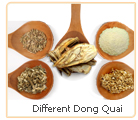 Angelic sinensis Angelic sinensis
Chinese Angelica
Female ginseng
Dang gui (Chinese)
Toki (Japanese)
Tanggwi (Korean)
Though there are many synonyms of Dong quai, it is helpful for research purposes to avoid these common spelling errors: Don quai, Dong qui or Dongquai. The pharmacology and chemical composition of Dong quai, Angelica sinensis, or whichever name chosen, is looked at below.
Pharmacology and Chemical Composition
Dong quai has been said to increase the photosensitivity of the skin. People taking Dong quai should be sure to stay out of the sun and protect themselves with sunscreen. It is also important not to take Dong quai with other drugs that cause photosensitivity such as tretinoin (Retin-A, Renova). It should also not be taken with some types of antibiotics, anti-depressants, cancer drugs or anti-psychotic medications.
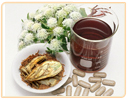 Due to anticoagulant (blood thinning) properties, Dong quai may increase the risk of bleeding, and should not be used in combination with other blood thinning drugs including aspirin, warfarin (Coumadin) or heparin. It also shouldn�t be taken at the same time as anti-platelet drugs such as clopidogrel (Plavix), and non-steroidal anti-inflammatory drugs such as ibuprofen (Motrin, Advil) or naproxen (Naprosyn, Aleve). Due to anticoagulant (blood thinning) properties, Dong quai may increase the risk of bleeding, and should not be used in combination with other blood thinning drugs including aspirin, warfarin (Coumadin) or heparin. It also shouldn�t be taken at the same time as anti-platelet drugs such as clopidogrel (Plavix), and non-steroidal anti-inflammatory drugs such as ibuprofen (Motrin, Advil) or naproxen (Naprosyn, Aleve).
Aside from the internal properties of Dong quai, it is also interesting to learn about the cultivation of the herb. Below is a brief description of how Dong quai grows.
How Does Dong Quai Grow?
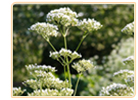 Dong quai grows in the damp mountains, meadows, and riverbanks of China, Japan, and Korea. A member of the celery family, this perennial plant blooms during the months of July and August. It reaches maturity after three years and can grow up to two meters tall. Dong quai grows in the damp mountains, meadows, and riverbanks of China, Japan, and Korea. A member of the celery family, this perennial plant blooms during the months of July and August. It reaches maturity after three years and can grow up to two meters tall.
What does Dong Quai Look Like?
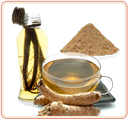 The Dong quai wild herb has a purple stem and blooms fragrant, white umbrella-shaped flowers that bear fruit. The root is used for several medicinal purposes; The head of the root has anticoagulant properties preventing coagulation or blood clotting. The Dong quai wild herb has a purple stem and blooms fragrant, white umbrella-shaped flowers that bear fruit. The root is used for several medicinal purposes; The head of the root has anticoagulant properties preventing coagulation or blood clotting.
The main part of the root can be used as a tonic or liquid remedy while the end prevents blood stagnation. Dong quai comes in a variety of forms that can be consumed orally including pills, powder, dried root/root slices, fluid extracts, tinctures, decoctions, and dried leaf preparations. Topical preparations are also available.
Now that Dong quai has been explained in detailed. Click the following link to read the next section to better understand how Dong Quai works.
Conclusions About Dong Quai
Despite its potential side effects, many women benefit from taking Dong quai and its ability to alleviate menstrual symptoms. Dong quai is a natural remedy that can relieve gynecological problems, as well as ailments affecting both genders. However, other alternative treatments are just as effective as Dong quai without the side effects.
Which herb should women try? Today women are looking for relief from their menopause symptoms with herbs. Phytoestrogenic herbs and non-estrogenic herbs are good in relieving menopause symptoms, but recent studies show that non-estrogenic herbs have no side effects because they help the body to produce its own hormones instead of introducing hormones like the phytoestrogenic ones. Learn more about non-estrogenic herbs for menopause.
| 

